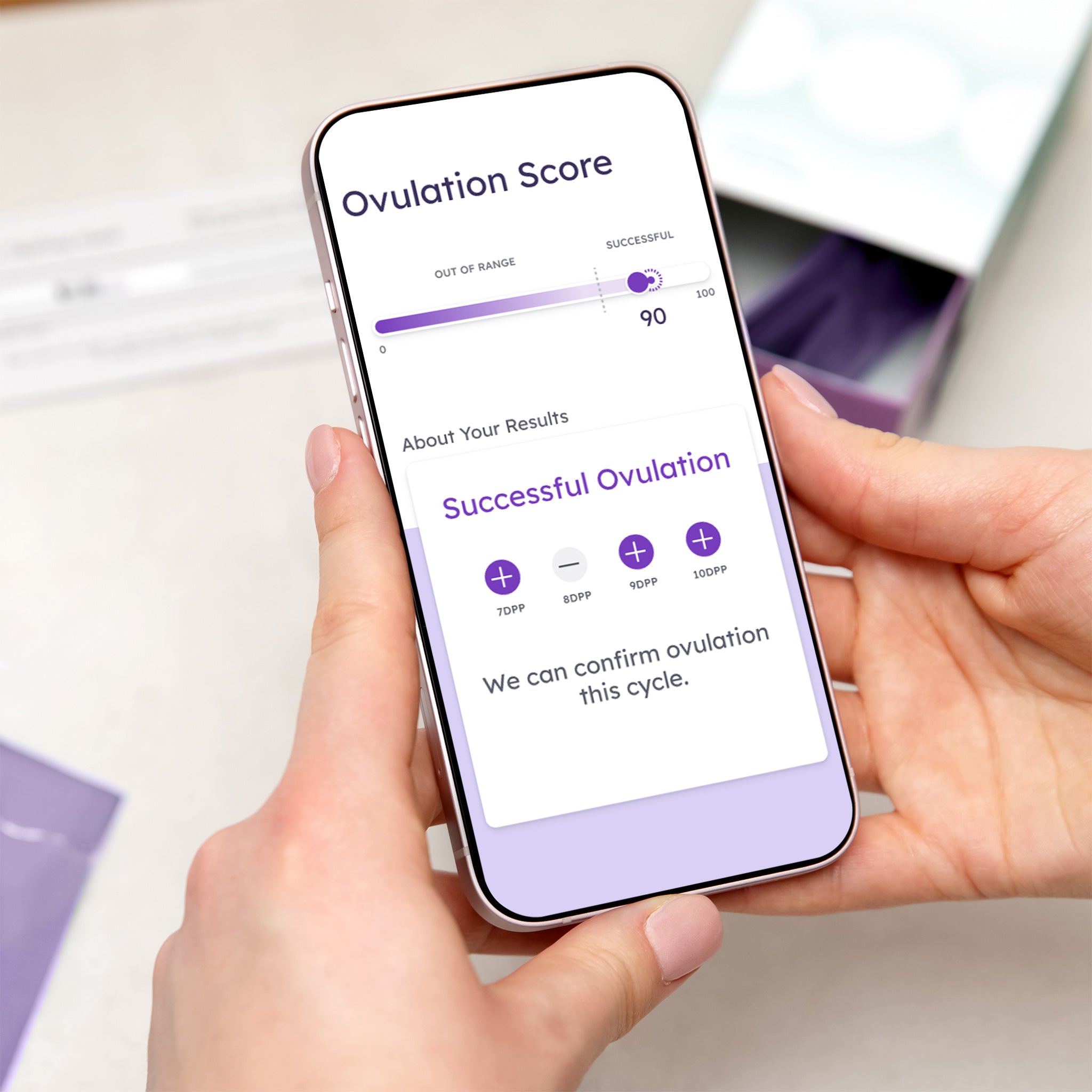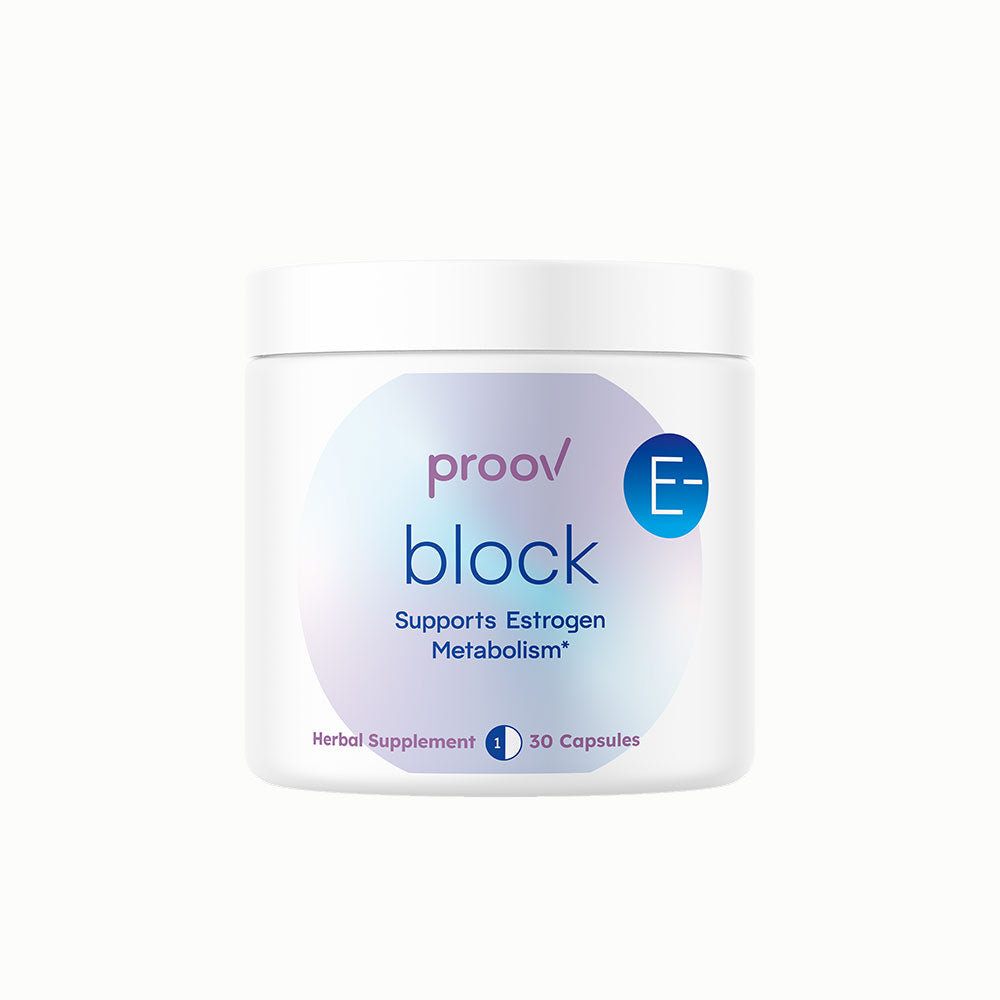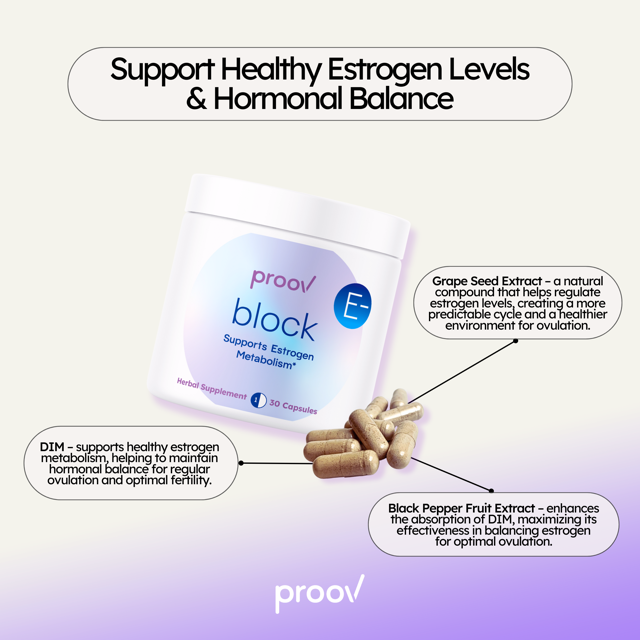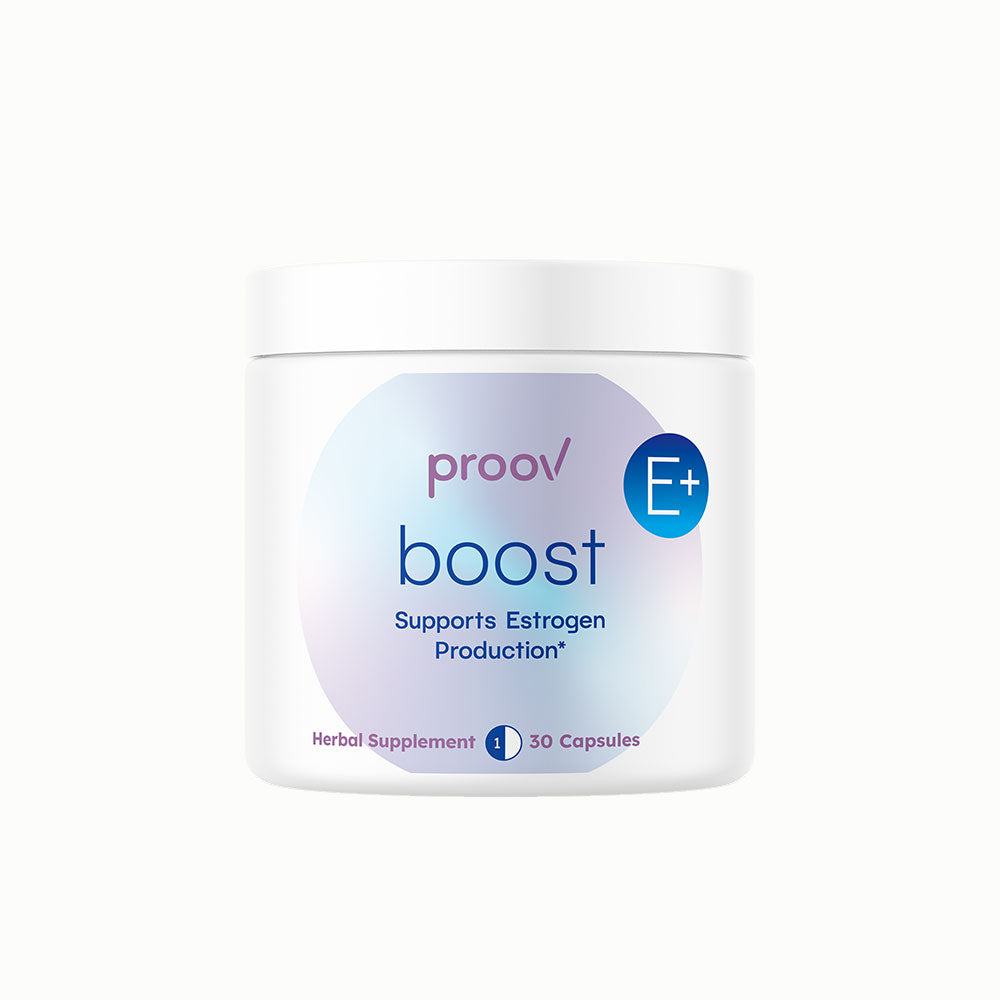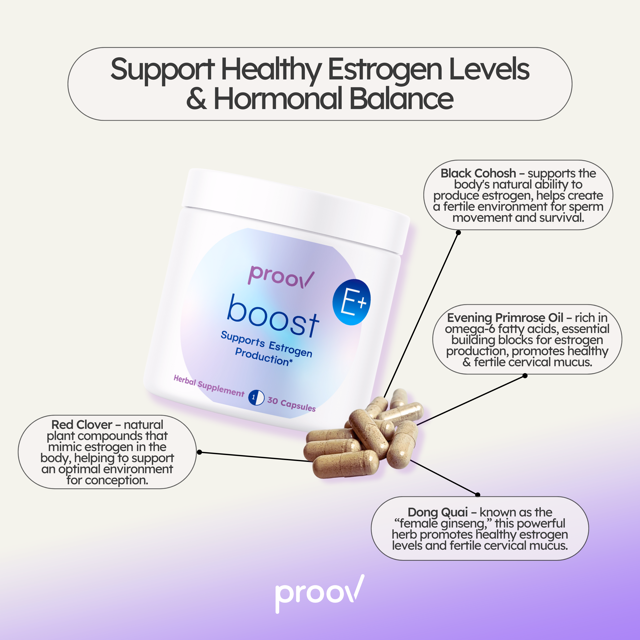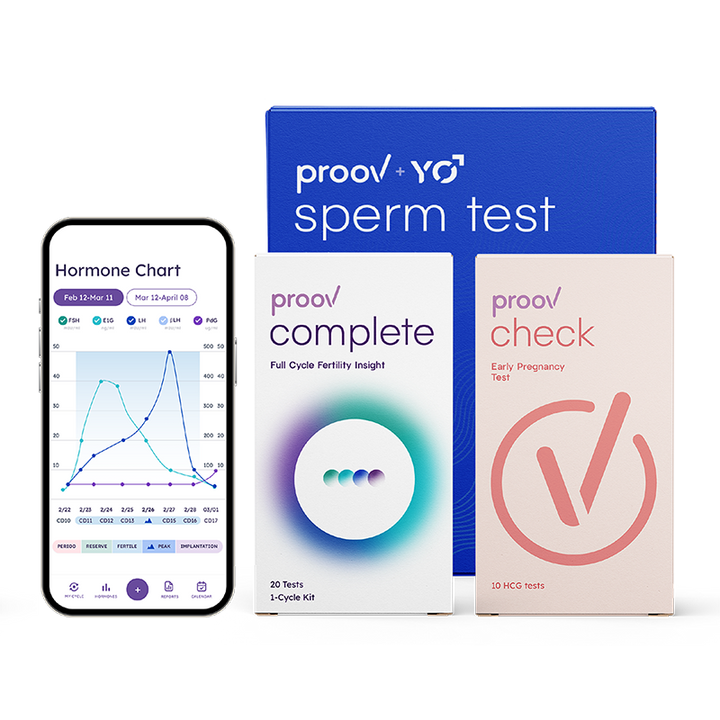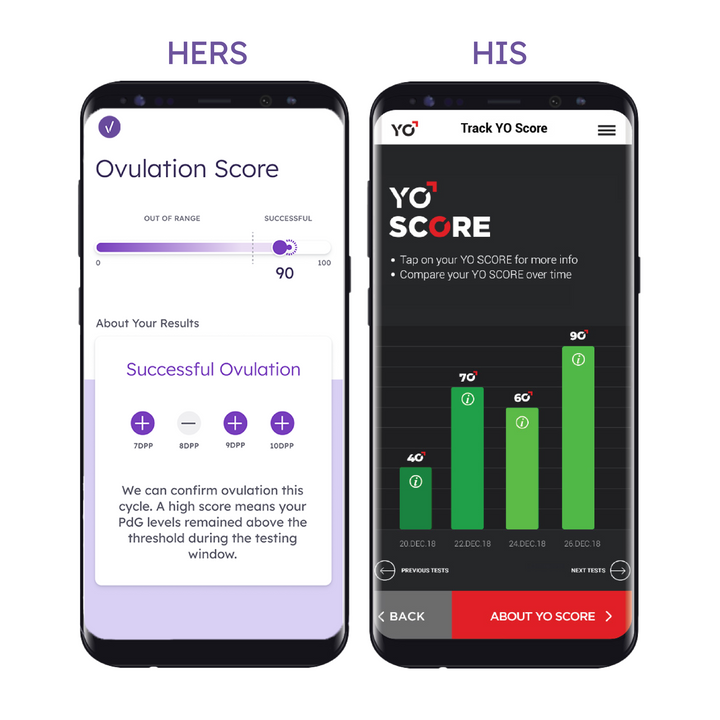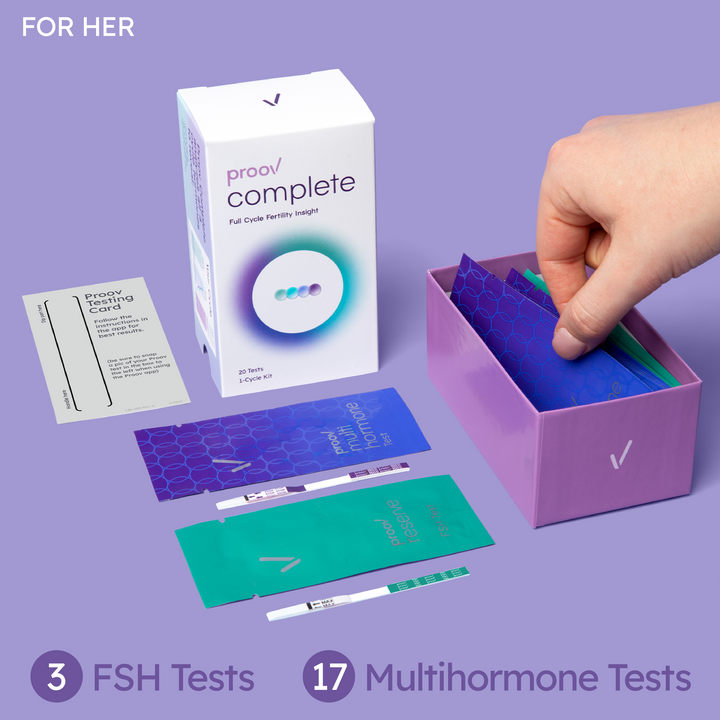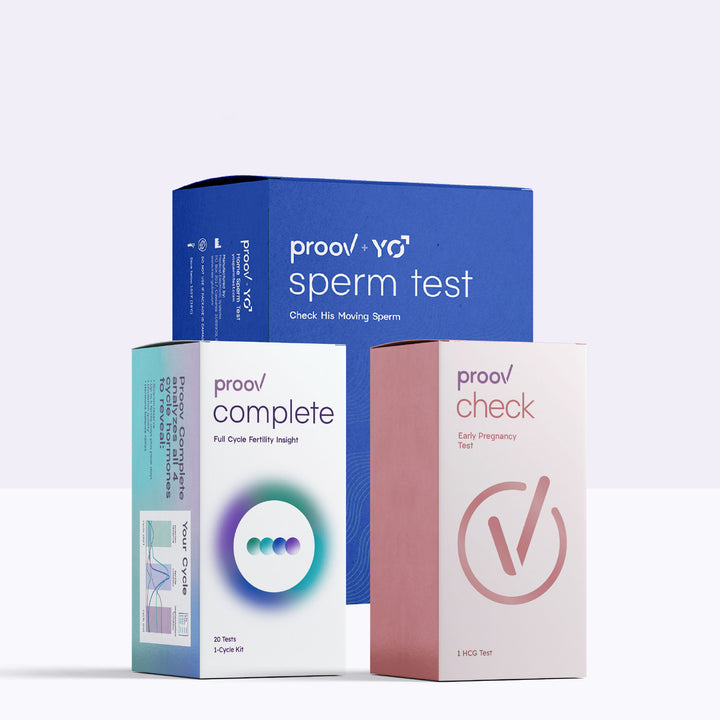Hers and His Advanced Fertility Test for Couples
- Regular price
- $268.99
- Sale price
- $268.99
- Regular price
- $303.99
Screen for 5 of the leading causes of infertility for 1/2 the cost of a single fertility center visit.
Details
What's Included
1:1 Support
99% Accurate
Non-invasive
Proov-exclusive Ovulation Score
Hers & His Kit
Toggle between the 3 products in our couples fertility test bundle to see what's included, when to test & learn more
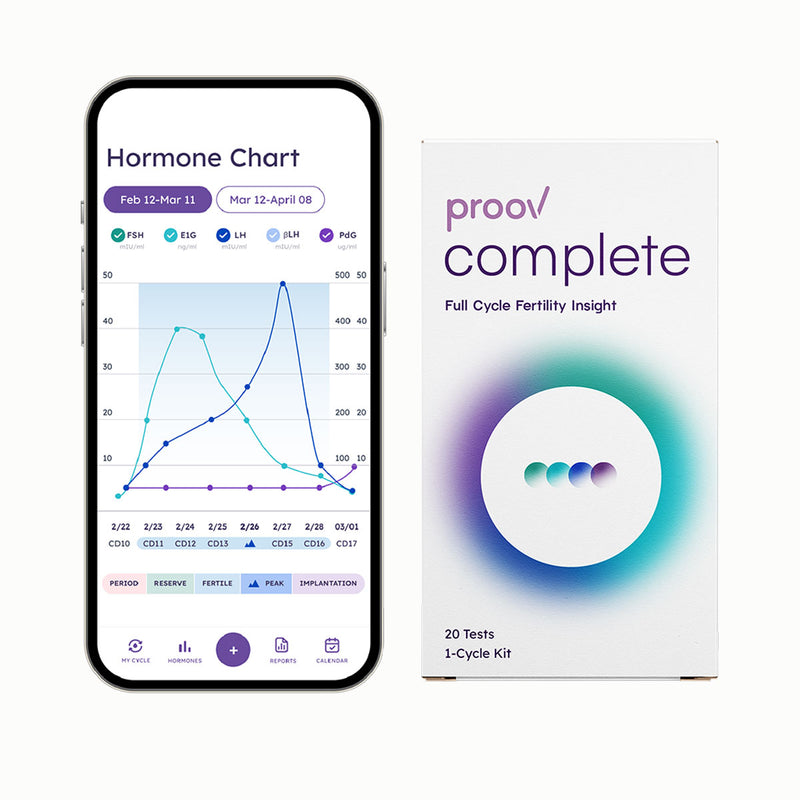

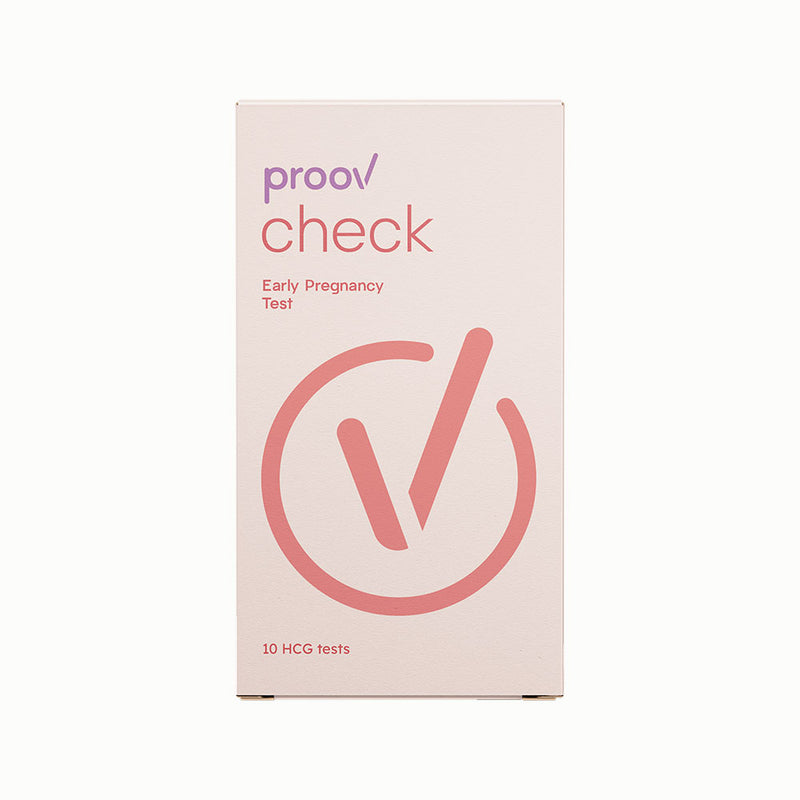
His and Hers Advanced Fertility Bundle
- 3 FSH tests
- 17 Multihormone tests
- Proov Insight app
- Proov app card
- Instructions for use
- *Please see FAQ for device compatibility list
Sperm TestCheck Pregnancy TestsWhat's Included–
- 3 FSH tests
- 17 Multihormone tests
- Proov Insight app
- Proov app card
- Instructions for use
- *Please see FAQ for device compatibility list
When You'll Test–
For all cycles tracked with Complete, you will need to start on cycle day 5 (a.k.a. 5 days after the start of your period).
Complete customizes your testing protocol to your unique cycle. While FSH testing days are always consistent, everyone’s testing protocol will look a little different based on their cycle length. The below represents testing for a 30-day cycle.
Please refer to kit instructions for specific details.
Complete is our most comprehensive test yet! You’ll track all 4 menstrual cycle hormones to screen for the leading causes of infertility.
- FSH (follicle stimulating hormone): FSH is the hormone responsible for selecting the follicle to ovulate in a given cycle and can provide insight into ovarian reserve.
- E1G (estrogen marker): A hormone marker that prepares the uterus to receive a pregnancy and it signals the opening of the fertile window — the 5-6 days each cycle with the highest possibility of getting pregnant.
- LH-beta (beta subunit of luteinizing hormone): A hormone that “spikes” right before ovulation to cause the egg to be released to help you time intercourse or insemination and PdG testing.
- PdG (progesterone marker): A hormone marker released after ovulation that supports implantation and confirms successful ovulation, which clinical studies show is correlated to a 75% increase in pregnancy rates.*
Want to dive deep into Complete? Check out our blog!
At the end of each Complete testing cycle, you’ll receive a full-cycle analysis, where you’ll learn about your ovarian reserve status, hormone levels and balance, and whether or not your ovulation was successful — all critical info to have when trying to get pregnant. From there, you can bring your results to your doctor to discuss the best next steps for you.
Want to share your Proov results with your doctor? Download this PDF to help them understand your results & the best next steps.
- Women with PCOS or endometriosis
- Women over 35
- Women with a history of early miscarriage
- Women who are taking ovulation induction medications
- Women who have been trying to conceive, but without success
Yes. You must use Proov Complete with the Proov Insight app to gain full-cycle hormone insights. Please note that Proov Complete is only compatible with the following phone models:
- iPhone 7 or higher running iOS 10 or above
- Select Android models, all running Android 10 or above: Samsung Galaxy Note20 or above, Galaxy S10 or above, Moto G or Z, and Google Pixel 3 or above.
We are working to add more models to this list. If you have a question about your phone model, please reach out to us at info@proovtest.com.
Traditional ovulation predictor tests measure just one hormone (luteinizing hormone) to identify your two most fertile days, but this is only one piece of the fertility puzzle. Proov Complete provides extensive additional data to help you better understand your hormone balance, cycle, and ovulation, so you can be better set up for success. In addition to measuring LH, you’ll measure FSH to assess your ovarian reserve, E1G (a marker of estrogen) to identify your longest possible fertile window, and PdG (a marker of progesterone) to check for successful ovulation.
Yes, it is essential you use the first urine of the morning for each test. When prompted by the app to test, collect your urine as soon as you wake up after holding it for at least six hours. Using anything other than first morning urine can cause inaccurate results.
There are many options for improving hormone balance or promoting successful ovulation — often we find the fix can be simple! While we always recommend consulting your doctor to determine the best next steps, you can find suggestions based only on your individual hormone insights in the Improovments section of the Proov Insight app.
Among other factors, cycle hormones play a key role in female fertility, which is why we always recommend at-home hormone testing if you're trying to conceive. Unlike other fertility tests, Proov Complete measures 4 key cycle hormones throughout your cycle to provide insight into ovarian reserve, the full fertile window, and successful ovulation during the implantation window.
- YO Wifi device
- 2 collection cups
- 2 YO slides, pipets, and liquefaction vials
- Instructions for use
He can test whenever he’s ready! However, it’s best not to have intercourse or ejaculate 2-5 days before testing so we recommend targeting testing accordingly.
- The Proov + YO Sperm test looks at Motile Sperm Concentration (or MSC for short).
- MSC is a measurement of the number of moving sperm per mL of semen. Since more motile sperm mean a higher chance of reaching an egg, this is the best screening tool for sperm.
- You’ll receive a YO score and a video of your sample, which can be shared with a doctor if you choose. A low result (MSC < 6M/ml or a YO score of < 40) indicates a lower than average motile sperm concentration
- Remember, it only takes 1 sperm to fertilize an egg, so it’s still possible to get pregnant even with a low score.
- If you have a low score, the YO app will provide fertility improvement tools, otherwise we always recommend talking to your doctor about possible treatment.
- Couples who want to ensure sperm are present and active
- Couples who have been trying for a few months without success
The Proov Male Fertility Test measures Motile Sperm Concentration (how many sperm are actually moving) and sperm quality. The YO app then compares your partner’s results to laboratory standards and to other men who have fathered children.
MSC is the number of moving sperm in 1 milliliter of your partner’s sample. The Proov Male Fertility test is an important test because it checks for moving sperm — a critical characteristic since sperm needs to be able to swim to the egg!
Since sperm must be able to swim to the egg for conception to occur, knowing your partner’s concentration of moving sperm is an important piece of the fertility puzzle. The Proov Male Fertility Test also provides a MSC ranking and a personal reference video, which can be shared with your doctor if needed.
Please see here for the Yo Sperm Test FAQ. For specific questions about your Yo Sperm test, we recommend reaching out to the Yo Sperm team directly at support@yospermtest.com.
Among other testing, sperm testing is one of the main screening tests done to determine male fertility. While testing for sperm count is important (i.e. if sperm is present and if so, how much), sperm *motility* is equally as important. This refers to whether or not the sperm can swim to where it needs to go - the egg! We recommend looking for a test that measures both, such as the Proov Sperm Test.
What's Included–
- 10 hCG tests to confirm pregnancy
- Instructions for use
Check can detect hCG in urine up to 5 days before your next expected period. You can test that early, or wait to test until after a missed period.
Please refer to kit instructions for specific details.
After a fertilized egg implants into the uterus, the placenta forms and produces hCG (human chorionic gonadotropin), also called the pregnancy hormone. Once a pregnancy begins, a small amount of hCG may be detectable in urine.
A positive Check test means you are most likely pregnant. A negative Check test could mean you are not pregnant, or the level of hCG is not yet high enough to be detected by the test.
If you are unsure of your results — regardless of if they are positive or negative — we recommend testing again at least 48 hours after initially testing.
- Women who want to check for pregnancy
- Women who are trying to conceive
Human Chorionic Gonadotropin (hCG) is the hormone produced by the body when you are pregnant. The presence of hCG in your urine suggests that you are most likely pregnant.
If you are testing with Proov Check before a missed period, you must use first morning urine. If you are testing with Proov Check after a missed period, you can test using urine from any time of day.
A positive Proov Check test indicates that hCG is present and you are most likely pregnant. We always recommend following up with your doctor to confirm pregnancy and discuss next steps.
A negative Proov Check test result could indicate that you are not pregnant or the amount of hCG was not high enough to be detected. If you are unsure of your result or still suspect you may be pregnant, you can test at least 48 hours later.
AS SEEN ON




“As a fertility doctor, Proov is one of the most comprehensive, reliable at home diagnostic testing and support systems I’ve ever seen. I love that Proov provides a suite of products that allows patients to have more information and tools from the comfort of home.”

Dr. Aimee Eyvazzadeh
New content loaded









